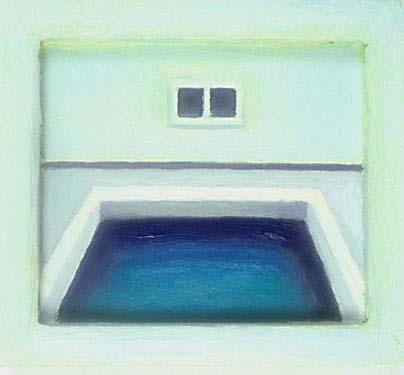Rachel Whiteread
dal 14/2/2003 al 29/3/2003
Segnalato da
14/2/2003
Rachel Whiteread
Luhring Augustine Gallery, New York
Two major pieces, a 22' high plaster cast of a staircase and a cast portion of a tiled floor. In this exhibition, she focuses her exploration on architectural spaces and continues to demonstrate an ongoing examination of the physical body's interaction with the space it inhabits. The major work in the main gallery will be an inverted staircase cast from a scale model.

Luhring Augustine is pleased to present an exhibition of new work by Rachel Whiteread. She will exhibit two major pieces, a 22’ high plaster cast of a staircase and a cast portion of a tiled floor. This exhibition will be Whiteread’s fifth New York show with Luhring Augustine.
In this exhibition, Rachel Whiteread focuses her exploration on architectural spaces and continues to demonstrate an ongoing examination of the physical body’s interaction with the space it inhabits. The major work in the main gallery will be an inverted staircase cast from a scale model. It has taken Whiteread several years of planning to solve the spacial and architectural difficulties inherent in constructing and removing the negative space of a staircase from the place and function that it originally served.
Previous castings of Whiteread’s were limited by the architectural dimensions of the space that the original subject inhabited; the size of the molds were limited to the dimensions of the doorways of the original building, which had to be left intact. The technical feat in this series of staircases was achieved using a new technique. After choosing and measuring an inspiring staircase, Whiteread built a scale model of the original in her studio. Using this method she had the freedom to make aesthetic choices that were not limited by the physical dimensions of the original building. Then Whiteread meticulously fabricated the surface of the piece with a combination of patterns and forms derived from years of casting from life. After replicating the surfaces of so many objects in her past work, their textures have become a visual language that Whiteread has begun to interpret more freely.
The second sculpture in the exhibition is twenty-five floor tiles cast in aluminum directly from an existing floor. In this case the surface is not invented but is an actual documentation of the original. By mixing real and fictitious surfaces, Whiteread creates a new dialogue and inserts herself and her aesthetic choices more substantially into the objects she creates. She has subtly eliminated a certain amount of nostalgia and replaced it with process, thereby creating a new paradox in the context of her work.
This is the last in a series of five staircases. The others have been shown in London at the Serpentine Gallery, Tate Britain, Haunch of Venison Yard and at the Guggenheim, Berlin and New York.
Rachel Whiteread has a long list of international distinctions, from the Turner Prize in 1993, to solo exhibitions at the Kunsthalle Basel, the Reina Sofia, The Serpentine Gallery and the Deutsche Guggenheim. She has completed several important public commissions including the Water Tower Project for the New York Public Art Fund, The Judenplatz Holocaust memorial in Vienna, and Monument for Trafalgar Square in London. Her work is housed in museums and private collections around the world, including the Museum of Modern Art, New York, the Stedelijk van Abbemuseum, Eindhoven, the Tate Gallery, London, and the Hirshhorn Museum, Washington, D.C.
Image: Rachel Whiteread, Monument, 2001 Resin and granite 9m x 5.1m x 2.4m
Luhring Augustine
531 West 24th Street New York, NY 10011



